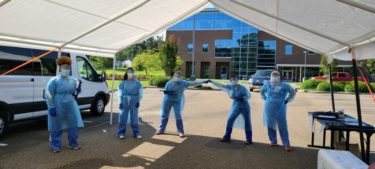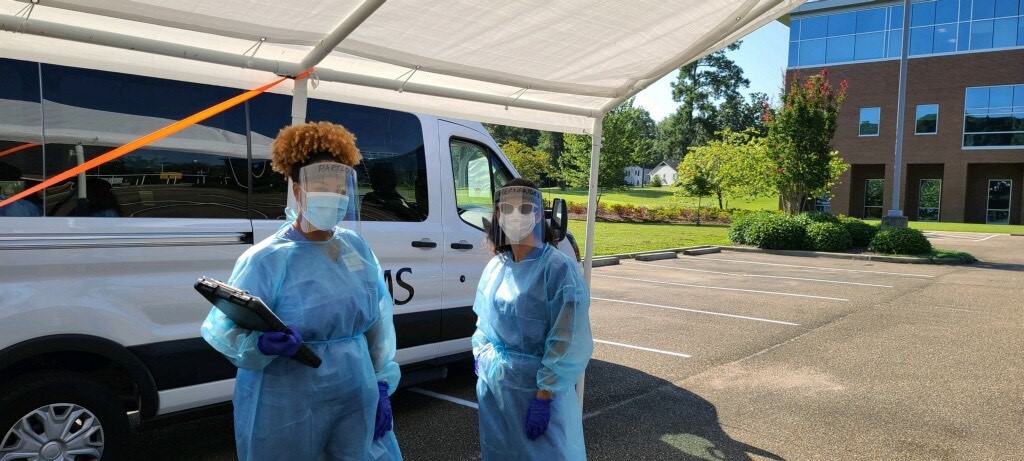Mobile Unit’s New Van Facilitates COVID-19 Testing Effort, Future Expansion Plans
| Thanks to the Blue & You Foundation, UAMS health professionals have a new large van to get to all areas of the state to perform community COVID-19 testing.
The van was purchased with a grant of $60,848 from the Blue & You Foundation, the charitable foundation of Arkansas Blue Cross and Blue Shield insurance company, for the Mobile Unit of the UAMS Office of Population Health. The Bank of America Foundation also has given $76,500 to UAMS for equipment and supplies for the Mobile Unit.
Recently, the Mobile Unit took the van to get to DeQueen, Helena and Magnolia to offer COVID-19 drive-up testing at no charge to community members.
“Our focus is on serving rural, underserved areas of the state,” said Kristie Hadden, Ph.D., UAMS senior strategy associate and interim director of population health. “The van is being sent to areas where people have a hard time getting to testing. We’re also seeking to serve populations that are particularly vulnerable to the virus, its spread, and poor outcomes, groups like Hispanics, Marshallese, possibly veterans and those who are homeless or housing insecure.”

Two members of the Mobile Unit bump gloved fists as the first vehicles line up behind them for drive-up COVID-19 testing.Image by Greg McKinney
The Mobile Unit is now staffed with a dedicated, fulltime program manager who works with communities to coordinate the weekly events and secure needed onsite volunteers, as well as a fulltime logistics coordinator who stocks, drives the van, and oversees onsite logistics. The mobile clinical team consists of trained and experienced nurses and medical professionals from UAMS’ COVID-19 triage program in the Integrated Medicine Service Line who register, swab, and collect the testing specimens for up to 200 community members at each site they visit.
The test specimens are taken back to UAMS for processing and follow-up with the patients with their results in several days. Patients do not have to get out of their vehicle, and all Mobile Unit staff and volunteers wear appropriate personal protective equipment (PPE).
The Office of Population Health is carrying on the mobile triage project that was launched in April, during a peak of testing activity in the pandemic that was created with volunteers and a borrowed van from the Arkansas Rural Health Partnership. From April through June, the mobile triage screened patients and tested those who were identified as in need of a COVID-19 test due to symptoms or exposure. Along with partners in the Arkansas Department of Health, the new program has changed to universal testing to meet community needs and demands across the state.
Patients are asked questions so that if a test comes back positive, UAMS epidemiologists can see if the person was asymptomatic or showing some signs of the disease, and can provide information for contact tracing as needed. Their answers also help the mobile unit’s health care professionals decide if a patient’s symptoms are severe enough to require emergency care.
Barbara McDonald, APRN, is a nurse practitioner in the UAMS College of Medicine Department of Neurology and is overseeing the clinical operations and staffing of the UAMS Mobile Unit.
McDonald said the van is well-suited to allow riders to be safely spaced apart and is being modified to be able to carry even more equipment and supplies if needed.
Where that van takes the team is now determined by a special set of factors, Hadden said.
UAMS selects sites after looking at reports from the university’s College of Public Health and the top counties that its epidemiologists recommend targeting for testing. They identify counties where testing might help mitigate spread. The Mobile Unit is also consistently receiving requests from communities around the state that have identified needs for testing in their counties.
“We also consider what testing may be coming up in target communities, too,” Hadden said. “We coordinate with the Health Department and other providers to make sure we’re not duplicating efforts.”
Hadden said in the coming months, the Mobile Unit plans to add other “wrapped around” services to COVID-19 testing drive-ups.
“The Office of Population Health aims to add other things to it to serve the community — health education and promotion, other health screenings for things like diabetes, blood-pressure, and tobacco use, as well as to provide needed vaccines. We will be focusing in areas of the state where chronic conditions make people more vulnerable to COVID-19 and many other health problems.”
